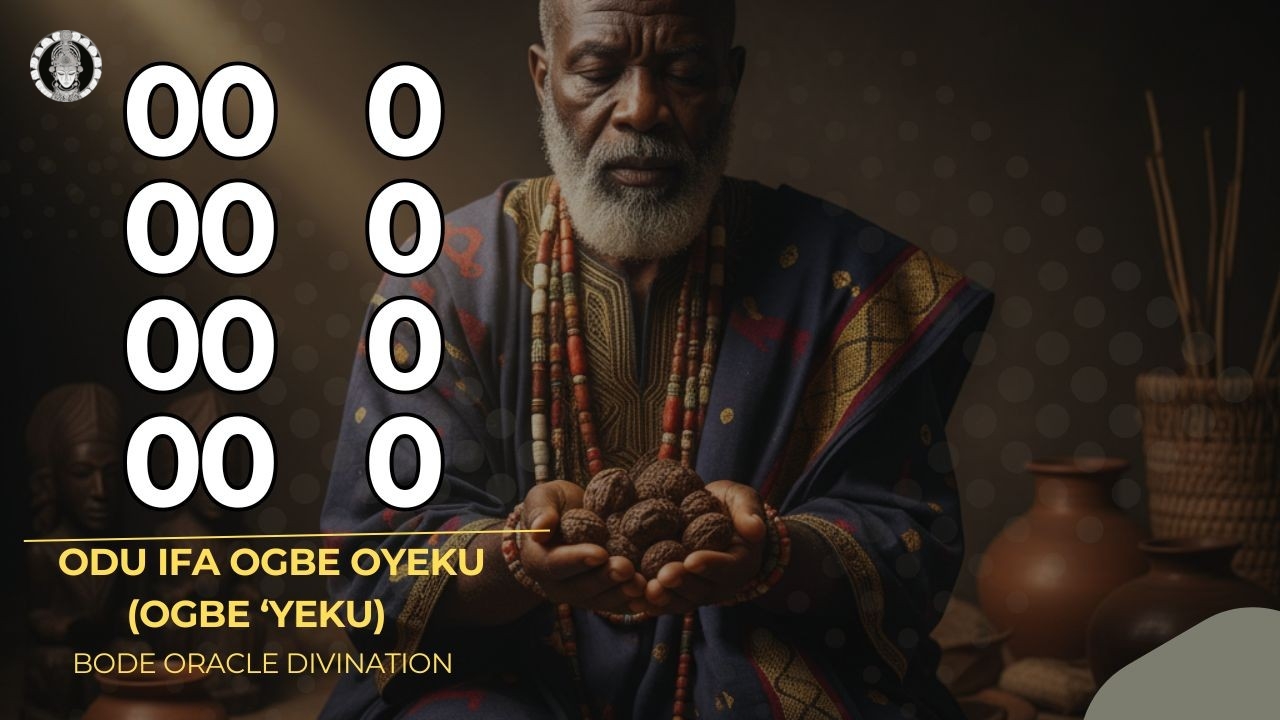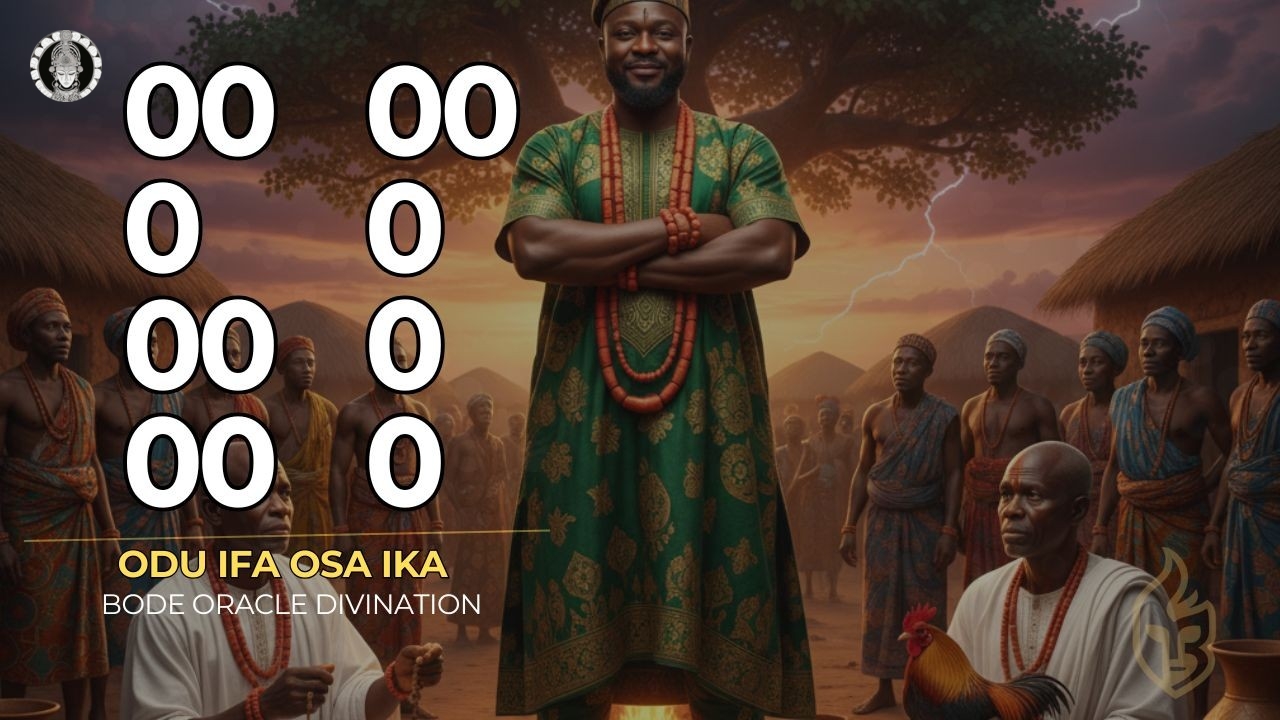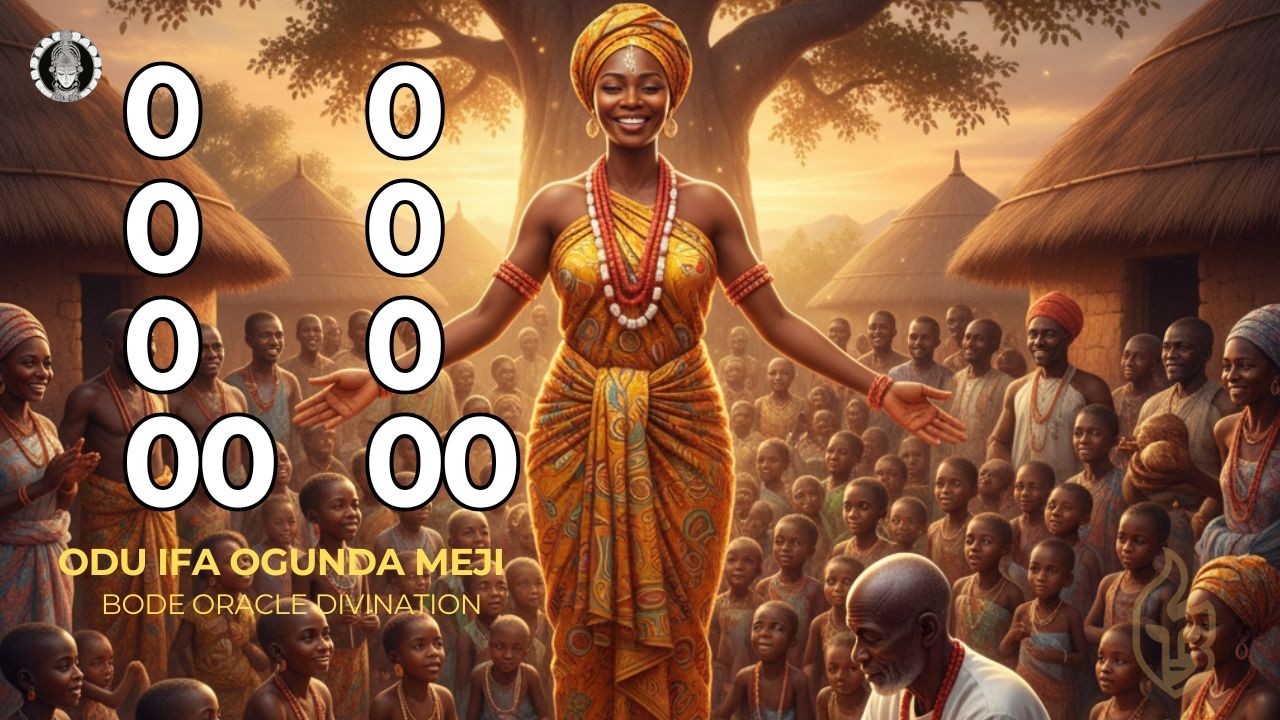Introduction to Odu Ifa Ogunda Meji (Ogundaji)
Odu Ifa Ogunda Meji, also known as Ogundaji, stands as one of the 16 principal Odu in the Ifa corpus—the doubled manifestation of Ogunda, carrying intensified warrior energy and profound spiritual power. This major Odu embodies the essence of strategic warfare, righteous conduct, fertility blessings, and the divine principles of victory through proper spiritual preparation. Ogunda Meji is intimately connected with Ogun, the powerful Orisa of iron, war, technology, and all metal implements, making this Odu particularly significant for those who engage in any form of struggle, competition, or conflict.
The divinations within Ogunda Meji address fundamental human experiences: the need for victory over adversaries, the power of good character to overcome limitations of birth and background, the desperate desire for children and fertility, and the wisdom to resolve conflicts through spiritual means. Each story serves as both tactical guidance and spiritual instruction, teaching us that success in any endeavor requires the combination of righteous conduct, strategic action, and proper sacrifice. For comprehensive understanding of the 16 Odu Ifa and their meanings, explore our detailed guide.
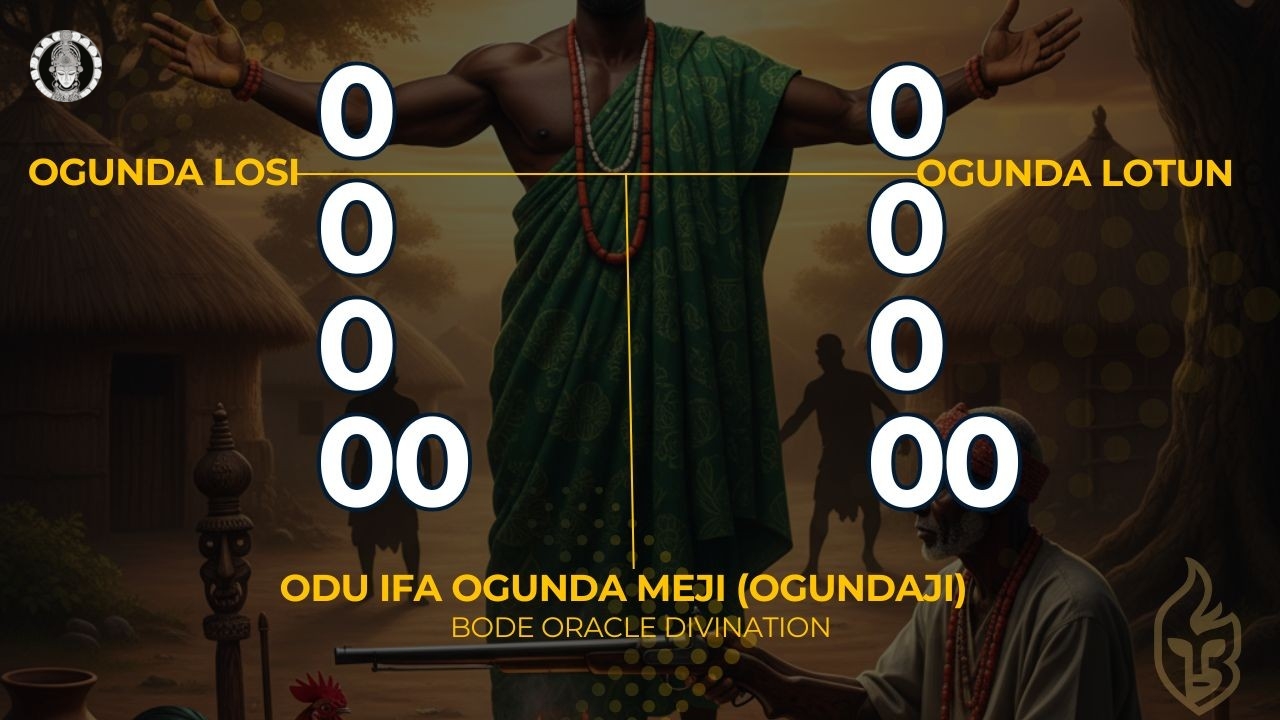
Ifa Divination for the Gun: The Power of Strategic Silence and Timely Action
Understanding the Weapon's Wisdom
This divination from Ogunda Meji presents one of the most powerful metaphors in the Ifa corpus—the gun or weapon as a spiritual entity seeking guidance in the midst of enemies. The choice of a weapon as the protagonist is deeply significant, as it represents the ultimate expression of Ogun's power and the principle that victory requires not just strength but strategic wisdom about when to act and when to remain still.
The divination reveals that even instruments of war must consult Ifa before engaging in conflict. This teaches that raw power without spiritual guidance leads to defeat, while power combined with divine wisdom leads to inevitable victory. The person receiving this Odu is surrounded by enemies—visible and invisible, known and unknown—and requires immediate spiritual intervention to overcome them all.
The Sacred Verse
Ogundaji awo ibon
Lo sefa fun ibon
Nigba ti nbe laarin ota
Ebo ni won ni kose
O gbebo nibe orubo
Nje enu ti ban fifohun
Ni n fi segun.
English Translation
Ogundaji, the priest of the gun,
Cast Ifa divination for the weapon,
In the midst of enemies.
He was instructed to offer a sacrifice,
And he complied.
For it is the same mouth the weapon uses to shut,
That it uses to emerge victorious.
The Paradox of the Silent Weapon
The concluding line of this verse contains profound tactical and spiritual wisdom: "It is the same mouth the weapon uses to shut, that it uses to emerge victorious." This paradoxical statement teaches multiple lessons. First, the weapon's "mouth" (its barrel or striking end) must be kept closed, silent, and still before it can be deployed effectively. Premature action or excessive talking about one's plans alerts enemies and dissipates spiritual power.
Second, the weapon's silence represents strategic patience—the ability to wait for the perfect moment to strike. A gun that constantly fires wastes ammunition and reveals its position; a weapon that remains quiet until the decisive moment conserves its power and achieves total victory. This teaches those under Ogunda Meji that discretion, strategic silence, and patient observation of enemies' movements are as important as the eventual action itself.
Ogundaji: The Priest of War Itself
The name "Ogundaji" (the Ifa priest who performed this divination) is itself significant—it means "Ogun has become doubled" or "Ogun stands twice," emphasizing the intensified warrior energy of Ogunda Meji. That even the weapon needed spiritual guidance from an Ifa priest shows that no one—no matter how powerful—should act without divine consultation. The mightiest warrior still requires the wisdom of Ifa to achieve victory.
The Importance of Feeding Ogun
This divination specifically requires feeding Ogun with two abori fish. The abori is a flat fish associated with Ogun in Yoruba spirituality, representing the deity's connection to water, adaptability, and the ability to move through hostile environments. By feeding Ogun with these fish, the person aligns themselves with the deity's protective and victorious energy, ensuring that Ogun fights on their behalf against all enemies.
Prescribed Offerings (Ebo)
For victory over enemies and spiritual protection, Ifa prescribes one rooster (akuko adie), representing the announcement of victory and the breaking of dawn after darkness; two abori-type fish (eja abori meji), specifically for feeding Ogun and invoking his warrior protection; palm oil (epo), symbolizing life force and the smoothing of difficulties; eko (fermented corn pudding), representing sustenance and the feeding of one's destiny; and kola nuts (obi), for prayer and communication with the spiritual realm. Learn more about Ogunda Meji divination practices on our dedicated page.
Practical Application for Modern Times
In contemporary society, this Odu speaks to anyone facing competition, litigation, business rivalry, workplace conflicts, or any situation where adversaries threaten one's progress. The "enemies" may be competitors trying to steal business, colleagues working against one's advancement, or even one's own fears and self-sabotaging behaviors. The teaching remains constant: strategic silence, proper spiritual preparation, and decisive action at the right moment bring total victory.
Ifa Divination for Ajanaa: The Triumph of Righteousness Over Heredity
Breaking the Limitations of Birth
This divination from Ogunda Meji addresses one of the most liberating themes in Ifa philosophy—that good character and righteous conduct can overcome the limitations of one's family background, social class, or hereditary expectations. Ajanaa represents anyone who aspires to achieve greatness in a field where they have no family tradition, natural advantages, or inherited resources. The verse teaches that righteousness (iwa rere) is more powerful than pedigree.
The divination specifically addresses the concern of becoming successful in an endeavor when one lacks the typical prerequisites for success in that field. Ajanaa wished to become a great farmer despite not being from a farming family—he had no inherited land, no farming knowledge passed down through generations, and no family connections in agricultural communities. Yet Ifa reveals that through proper sacrifice and commitment to good deeds, he would succeed where those with natural advantages might fail.
The Sacred Verse
Ore lope
Ika kosunhan
Adifa fun ajanaa
Ni jo ti lole je oloko
Lai ba won tan
Ebo ni won ni ko se
O gbebo ni be orubo ni be
Nje kini ofi ajanaa joloko
Ohun rere
Lo fi ajanaa joloko
Ohun rere.
English Translation
The best thing in life is good deeds.
Evil does not pay.
Ifa divination was cast for Ajanaa
On the day he wished to leave
And become a great farmer,
Even though he was not from a farming family.
He was instructed to offer a sacrifice,
And he complied.
Thus, what will make Ajanaa a great farmer
Are good deeds.
That is what makes Ajanaa the great farmer of righteousness.
The Opening Declaration: Ore Lope, Ika Kosunhan
The verse opens with a powerful moral declaration: "Ore lope, Ika kosunhan"—"The best thing in life is good deeds; evil does not pay." This establishes the fundamental principle governing the entire divination. In Yoruba cosmology, iwa (character) is considered more important than any other attribute. Good character attracts blessings even without sacrifice, while bad character repels blessings even with elaborate offerings.
The statement "evil does not pay" (ika kosunhan) is particularly significant. While evil actions might bring temporary gains, they ultimately lead to loss, suffering, and spiritual bankruptcy. Those who succeed through wickedness may appear prosperous, but their success is unstable and will eventually collapse. In contrast, those who build success on righteousness create foundations that endure through generations.
Feeding Ori: The Importance of the Guinea Fowl
This divination specifically requires offering a guinea fowl (eye etu) to feed one's ori (inner spiritual head/destiny). The guinea fowl is particularly significant because it is a bird that lives both in the wild and in domestic spaces, representing the ability to adapt to any environment—exactly the quality Ajanaa needs to succeed in an unfamiliar field. The guinea fowl is also associated with alertness and early warning, teaching the principle of vigilance necessary for success in new endeavors. For deeper understanding of Yoruba spiritual philosophy and divination systems, consult scholarly resources on African Traditional Religions and Ifa Divination.
The Repetition of "Ohun Rere"
The verse concludes by asking and answering: "What will make Ajanaa a great farmer? Good deeds (ohun rere). That is what makes Ajanaa the great farmer of righteousness (ohun rere)." The repetition of "ohun rere" (good things/good deeds) emphasizes that success comes not from manipulation, exploitation, or cutting corners, but from consistent commitment to righteous action. This repetition also serves as an incantation—by stating it twice, the spiritual power of righteousness is doubled, just as Ogunda is doubled in Ogunda Meji.
Prescribed Offerings (Ebo)
For success in new endeavors and overcoming limitations of background, Ifa prescribes one guinea fowl (eye etu kan), specifically for feeding one's ori and enhancing adaptability; one rooster (akuko adie kan), representing the announcement of one's arrival in the new field; palm oil (epo), for smoothing the path and making the journey pleasant; kola nuts (obi), for prayers and spiritual communication; and eko (fermented corn pudding), for sustaining the journey and feeding one's destiny.
Practical Application for Modern Times
This Odu speaks powerfully to career changers, immigrants in new lands, first-generation college students, entrepreneurs without business backgrounds, and anyone attempting to succeed in fields where they lack traditional advantages. It teaches that the combination of good character, hard work, proper sacrifice, and divine favor can overcome any deficit of pedigree, connections, or inherited resources.
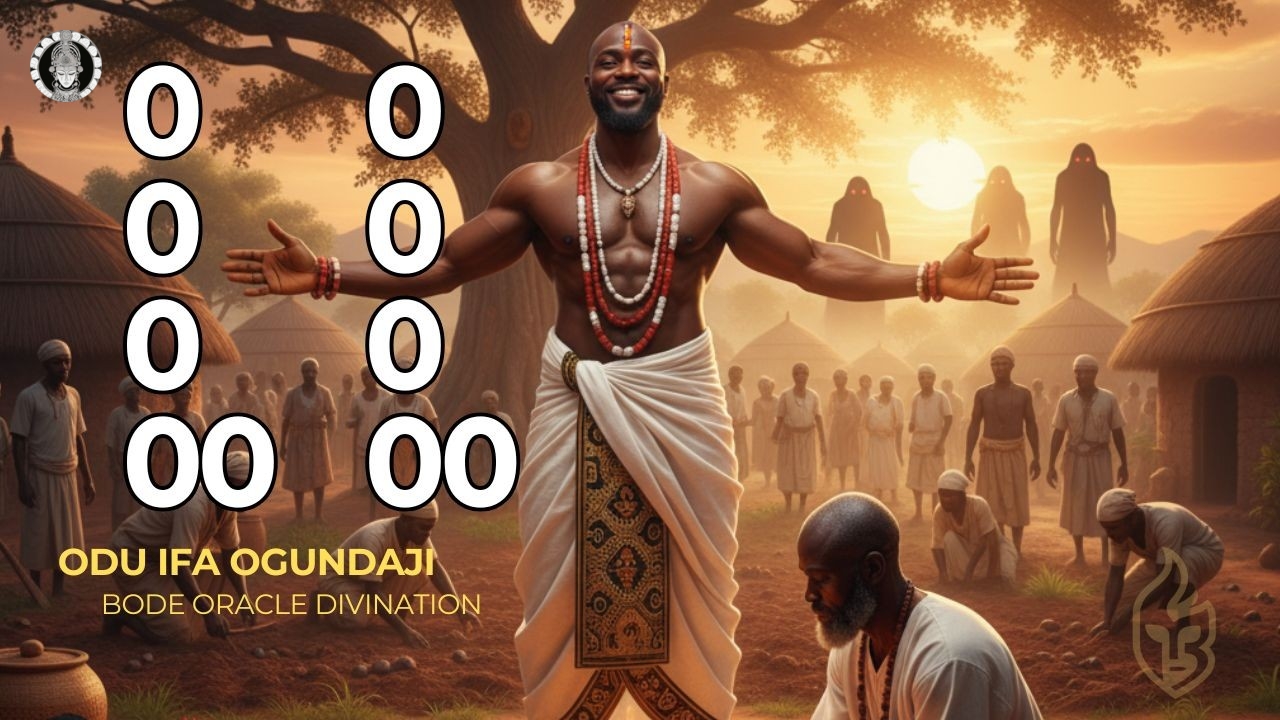
Ifa Divination for the Bee: The Blessing of Abundant Fertility
The Anguish of Childlessness
This divination from Ogunda Meji addresses one of the most emotionally painful experiences a person can face—the desperate longing for children when conception seems impossible. The Bee, known for its productivity and organized community structure, found itself weeping in two different cities (Ipo and Ofa) over the lack of offspring. This dual mention of cities emphasizes that the problem followed the Bee everywhere—no change of location could solve what required spiritual intervention.
The choice of the Bee as protagonist carries profound symbolic meaning. Bees are among the most fertile and productive creatures in nature, living in highly organized colonies where reproduction is central to survival. That even such a naturally fertile creature experienced childlessness demonstrates that fertility is not merely biological but spiritual—it requires divine intervention and proper sacrifice regardless of natural capacity.
The Sacred Verse
Abemonle ekan
Abojuregunregun
Adifa fun oori ti n sunkun omo rode Ipo
Lodi fa fun oori ti sunkun omo rode Ofa
Ebo ni won ni ko se
O gbebo ni be orubo nibe
Nje oyin roguun oyin bi ogun
Won ni ki oyin o ru ogbon
Oyin bi ogbon
Ero ipo
Ero ofa
Eyin o mo pogun omo koto oori.
English Translation
Abemonle Ekan, Abojuregunregun,
Ifa divination was cast for the Bee,
Who was weeping for the blessing of a child in the city of Ipo.
Ifa divination was also cast for the Bee,
Who was weeping for the blessing of a child in the city of Ofa.
The Bee was instructed to offer a sacrifice,
And she complied.
Thus, the Bee saw twenty and gave birth to twenty children.
The Bee saw thirty and gave birth to thirty.
Pilgrims of Ipo,
Pilgrims of Ofa,
Do you not know that twenty children are not enough?
The Mystical Names: Abemonle Ekan and Abojuregunregun
The two Babalawos who cast this divination have names that carry significant meaning. "Abemonle Ekan" suggests one who carries or bears the burden of the stomach/womb—directly addressing fertility issues. "Abojuregunregun" contains the root "jure" (to rise up, to succeed) combined with repetition, suggesting continuous rising or multiplication. These names were not randomly chosen but reflect the specialization of these priests in fertility matters and their understanding of the multiplication of blessings.
The Progression of Numbers: Twenty to Thirty and Beyond
The verse presents an extraordinary progression of fertility: "The Bee saw twenty and gave birth to twenty; the Bee saw thirty and gave birth to thirty." This is not merely literal but represents the principle of abundance beyond expectation. In Yoruba numerology, twenty (ogun) and thirty (ogbon) are significant numbers associated with completeness and maturity. The verse teaches that when Ifa blesses someone with fertility, the blessing is not modest but overwhelming—far exceeding what was originally requested.
The rhetorical question "Do you not know that twenty children are not enough?" (Eyin o mo pogun omo koto oori) is particularly powerful. It suggests that those who doubt Ifa's ability to grant fertility or who lose hope should understand that Ifa's blessings far exceed human expectations. What seems impossible (even one child) becomes not just possible but abundant (twenty, thirty, or more in spiritual terms—meaning numerous offspring and descendants).
The Spiritual Significance of Four Snails
This divination specifically requires feeding the deity with four snails (igbin merin). The snail is particularly associated with fertility in Yoruba spirituality because it carries its home on its back (representing self-sufficiency), moves slowly and deliberately (representing patience), and produces abundant offspring. The number four represents stability and the four cardinal points, suggesting that fertility blessings will be stable and complete. The cool, soothing nature of snails also addresses the "hot" condition of infertility, bringing the cooling necessary for conception. For scholarly perspectives on Ifa as a knowledge system, refer to UNESCO documentation on Ifa of the Yoruba People.
Prescribed Offerings(Ebo)
For fertility blessings and conception, Ifa prescribes four snails (igbin merin), specifically for feeding the deity and invoking fertility; one rat (eku kan), representing multiplication and rapid reproduction; one fish (eja kan), symbolizing fertility and abundance from the waters; one hen (abo adie kan), representing motherhood and nurturing; palm oil (epo), for life force and vitality; eko (fermented corn pudding), for sustaining the pregnancy and feeding destiny; and kola nuts (obi), for prayers and spiritual communication.
Practical Application for Modern Times
This Odu speaks directly to couples struggling with infertility, those who have experienced multiple miscarriages, and anyone who has lost hope of ever bearing children. It teaches that fertility is ultimately a spiritual blessing that requires both medical intervention (where appropriate) and spiritual work. The emphasis on the Bee's compliance with sacrifice teaches that hope combined with obedience to spiritual prescription brings results that far exceed expectations. Explore more wisdom from our collection of Ifa teachings.
Ifa Divination for Orunmila Taking a Wife: The Spiritual Resolution of Conflict
The Universal Challenge of Domestic Harmony
This divination from Ogunda Meji presents a remarkable teaching—even Orunmila himself, the deity of wisdom and divination, required spiritual preparation when taking a wife. This demonstrates that no one is exempt from the challenges of relationships and domestic life, and that even divine beings must perform proper sacrifice to ensure harmony. The fact that Orunmila consulted Ifa before marriage teaches the importance of spiritual preparation before major life commitments.
The divination addresses the inevitable conflicts that arise in domestic life—the "problem that arose last night" (oro ta ro keke sin ale ana). Rather than suggesting that sacrifice prevents all conflicts, Ifa teaches that proper spiritual preparation provides the wisdom and means to resolve conflicts quickly and peacefully, preventing them from escalating into permanent divisions.
The Sacred Verse
Orekojonaa sefinrin
Adifa fun orunmila
Nijo ti lo le gba obinrin kan
Ebo ni won ni ko se
O si gbebo nibe orubo
Nje oro ta ro keke sin ale ana
Mo fi soti mu gbere fun
Mofo royii mu taba gbere fun.
English Translation
Orekojonaa Sefinrin,
Ifa divination was cast for Orunmila
On the day he was about to take a wife.
He was instructed to offer a sacrifice,
And he complied.
Therefore, the problem that arose last night,
I have resolved it all with wine.
I have resolved it with tobacco.
The Power of Wine and Tobacco in Conflict Resolution
The verse concludes with a powerful statement about spiritual tools for resolving domestic conflicts: "I have resolved it all with wine. I have resolved it with tobacco." This is not suggesting alcoholism or substance abuse but referring to specific ritual uses of these substances in Yoruba spirituality. Wine (oti) is used in libations and offerings that cool hot tempers and restore harmony. Tobacco (taba) is used in spiritual work for clarity, communication, and binding agreements.
In Yoruba practice, offering wine during a dispute symbolizes the willingness to share something precious, to cool emotions, and to create a moment of communion that transcends anger. Tobacco smoke carries prayers and intentions to the spiritual realm while also serving as a binding agent for reconciliation. The person under this Odu learns that conflicts are resolved not through aggression or stubbornness but through spiritual wisdom and the proper use of cooling, clarifying substances.
Feeding Ifa with Goat
This divination specifically requires feeding Ifa with a goat (eran ewure). The goat is particularly significant in relationship matters because it is an animal associated with fertility, domesticity, and the ability to navigate rough terrain. By feeding Ifa with goat, the person ensures that their relationship will be fertile (producing children and blessings), domestic (peaceful and harmonious), and able to weather rough times (conflicts, challenges, external pressures).
Prescribed Offerings (Ebo)
For domestic harmony and conflict resolution, Ifa prescribes one goat (eran ewure kan), specifically for feeding Ifa and ensuring relationship stability; palm oil (epo), for smoothing interactions and cooling tempers; eko (fermented corn pudding), for sustaining the relationship; kola nuts (obi), for prayers and maintaining communication; tobacco leaf (ewe taba), for spiritual clarity and binding reconciliation; and wine (oti), for cooling conflicts and creating moments of communion.
Practical Application for Modern Times
This Odu speaks to anyone about to enter marriage, those experiencing domestic conflicts, or people struggling with relationship challenges. It teaches that even the wisest must prepare spiritually for domestic life and that conflicts are normal but can be resolved through spiritual wisdom rather than escalation. The emphasis on resolving problems that arose "last night" teaches the importance of quick resolution—not allowing conflicts to fester and grow.
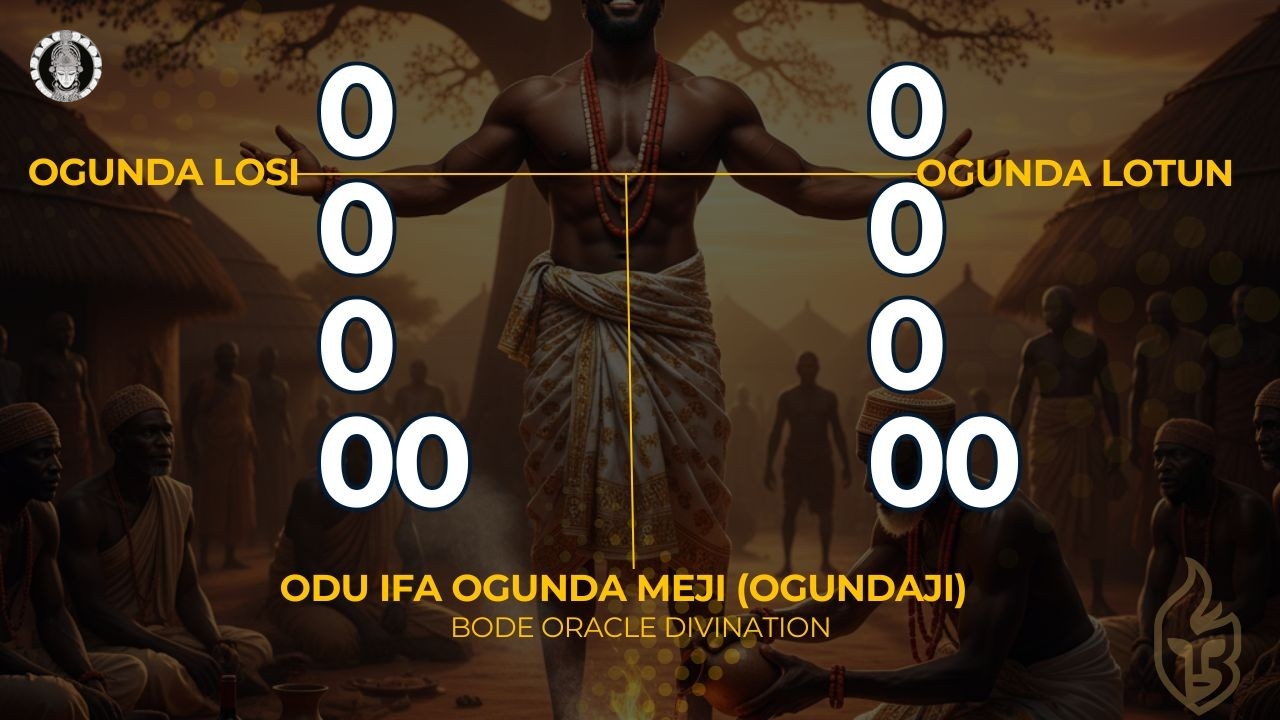
Spiritual Preparations (Awure) of Ogunda Meji
Understanding Spiritual Preparations in Ogunda Meji
Beyond the prescribed sacrifices (ebo), Ogunda Meji provides specific spiritual preparations (awure) that enhance the effectiveness of the offerings and provide ongoing protection and blessings. These preparations work in conjunction with the sacrifices to create comprehensive spiritual coverage, addressing both immediate needs and long-term spiritual development.
Awure for Spiritual Fortification and Fertility
This preparation is specifically designed to strengthen one's spiritual body, enhance fertility, and provide daily spiritual protection. It combines physical cleansing with spiritual empowerment, ensuring that the person's entire being is aligned with the blessings they seek.
Ingredients and Preparation
The preparation requires Abemonle Ekan leaves (the same mystical plant mentioned in the Bee's divination, associated with bearing and fertility) and Osusu leaves (a plant known for its protective and cleansing properties in Yoruba herbalism). These leaves are ground together and mixed with black soap (ose dudu), creating a spiritually potent cleansing agent.
Application Method
The person should bathe with this mixture every morning (larolaro). Morning bathing is particularly significant because it prepares the person spiritually for the day ahead, creating a protective shield before encountering any negative forces. The regular, consistent use (every morning) demonstrates that spiritual protection is not a one-time event but an ongoing practice that requires discipline and commitment.
Spiritual Properties
Abemonle Ekan addresses fertility and the ability to carry blessings to completion. Osusu leaves provide cleansing and protection against spiritual attacks. Black soap serves as both a physical cleanser and spiritual purifier, removing negative influences while maintaining the body's natural spiritual defenses. Together, these create a comprehensive spiritual bath that fortifies fertility, removes obstacles, and provides daily protection.
Awure for Victory Over Enemies (Isegun)
This preparation is designed specifically for those facing opposition, competition, or spiritual warfare. It provides the spiritual weaponry necessary to overcome all adversaries while maintaining one's integrity and righteousness.
Ingredients and Preparation
The preparation requires tobacco leaves (ewe taba), which are ground with black soap (ose). This mixture is then combined with foreign wine (oti oyinbo—literally "white person's wine," referring to spirits like gin or vodka). Additionally, a small portion of tobacco leaves is placed directly into the wine, creating both an external wash and an internal spiritual medicine.
Application Method
The person should drink the tobacco-infused wine while also using the tobacco and soap mixture for bathing. This dual application—internal and external—ensures complete spiritual coverage. The internal consumption activates spiritual power from within, while the external bathing creates a protective shield on the physical body.
Spiritual Properties and Cautions
Tobacco has powerful spiritual properties in Yoruba practice—it brings clarity, cuts through confusion, binds enemies, and carries prayers to the spiritual realm. However, this preparation should only be used under the guidance of a qualified Babalawo who can properly prepare it and invoke the necessary incantations. The alcohol content and tobacco should be used in spiritual doses, not amounts that would cause intoxication or health problems. For understanding the artistic and cultural dimensions of Ifa practice, explore UNESCO recognition of the Ifa divination system.
Important Considerations for All Spiritual Preparations
All spiritual preparations in Ogunda Meji should be prepared and used under the guidance of a qualified Babalawo. The spiritual power comes not merely from the physical ingredients but from the prayers, invocations, and spiritual knowledge that accompany their preparation and use. A Babalawo will also determine through divination whether a particular preparation is appropriate for an individual's specific situation, spiritual state, and health condition.
Modern Adaptations
In contemporary practice, some ingredients may require substitution based on availability, legal considerations, or health concerns. A knowledgeable Babalawo can identify spiritually equivalent substitutes while maintaining the essential properties of the preparation. The core principle remains: combining substances that carry specific spiritual properties while invoking the appropriate spiritual forces through prayer and ritual.
Additional Resources
Internal Links
- Complete Guide to Ogunda Meji - Detailed information, taboos, and practices
- What is Odu Ifa Ogunda Meji?
- Ogunda Meji Blog Post
- Bode.ng Blog - Extensive collection of Ifa and Yoruba spirituality articles
- Complete Odu Ifa Directory
External Resources
- African Traditional Religions: Ifa Divination - Duquesne University
- Ifa of the Yoruba People of Nigeria - UNESCO
- Opon Ifa - Wikipedia
- UNESCO Recognition of Ifa Divination System
- Ifa Divination System - Wikipedia
Connect With Us on Social Media
- BODE Oracle on TikTok
- BODE Oracle on YouTube
- BODE Oracle on Facebook
- BODE Oracle on X (Twitter)
- BODE Oracle on Pinterest
Visit Bode.ng to explore more divination teachings, participate in quizzes and polls, and connect with our community of practitioners and learners. Register today to access exclusive content and personalized guidance on your spiritual journey.
Frequently Asked Questions And Answers About Odu Ifa Ogunda Meji (Ogundaji)
Find answers to common questions about this sacred Odu Ifa and its divination teachings
Ogunda Meji, also called Ogundaji, is one of the 16 principal Odu (major divination signs) in the Ifa corpus. It is the doubled manifestation of Ogunda, carrying powerful warrior energy and messages about victory over enemies, righteous conduct leading to success, fertility and childbearing, and conflict resolution. This Odu is closely associated with Ogun, the deity of iron, war, and technology, and teaches that success comes through both spiritual preparation and righteous action.
The divination of the Gun (weapon) in Ogunda Meji demonstrates that victory comes through proper spiritual preparation and feeding Ogun. The verse teaches that "it is the same mouth the weapon uses to shut that it uses to emerge victorious"—meaning that strategic silence and timely action bring success. When prescribed offerings (rooster, two abori fish, palm oil, eko, and kola nuts) are made to Ogun, the person gains victory over all adversaries.
The divination of Ajanaa teaches that "the best thing in life is good deeds; evil does not pay." Even when someone is not from a particular background or family tradition, through righteousness and proper sacrifice, they can achieve greatness in that field. The story shows that good character (iwa rere) combined with spiritual practice allows one to succeed where others might fail, becoming "the great farmer of righteousness" despite having no farming heritage.
The divination of the Bee addresses those desperately seeking children. It reveals that fertility requires both patience and proper sacrifice—the Bee who was weeping in Ipo and Ofa was told to sacrifice four snails, one rat, one fish, one hen, palm oil, eko, and kola nuts. After compliance, the Bee "saw twenty and gave birth to twenty; saw thirty and gave birth to thirty," symbolizing abundant fertility. The verse asks "do you not know that twenty children are not enough?"—emphasizing that blessings multiply beyond expectation when proper sacrifice is made.
Ogun is the presiding deity of Ogunda Meji. As the Orisa of iron, war, technology, and all implements of metal, Ogun represents strategic warfare, protection, and the power to clear obstacles. Multiple divinations in Ogunda Meji require feeding Ogun with fish (particularly abori fish) and other offerings. The connection between the weapon and Ogun in the first verse emphasizes that those under this Odu must maintain a strong relationship with Ogun through regular offerings and righteous conduct to ensure victory in all endeavors.
The verse teaches that "it is the same mouth the weapon uses to shut that it uses to emerge victorious." This means strategic silence and patient observation are as important as action itself. A weapon that constantly fires wastes ammunition and reveals its position; one that remains quiet until the decisive moment conserves power and achieves total victory. This teaches discretion, strategic patience, and the wisdom of timing in all conflicts.
"Ika kosunhan" (evil does not pay) teaches that while evil actions might bring temporary gains, they ultimately lead to loss, suffering, and spiritual bankruptcy. Those who succeed through wickedness may appear prosperous, but their success is unstable and will eventually collapse. In contrast, those who build success on righteousness create foundations that endure through generations, attracting blessings even without elaborate sacrifices.
The snail is particularly associated with fertility in Yoruba spirituality because it carries its home on its back (representing self-sufficiency), moves slowly and deliberately (representing patience), and produces abundant offspring. The number four represents stability and the four cardinal points, suggesting that fertility blessings will be stable and complete. The cool, soothing nature of snails also addresses the "hot" condition of infertility, bringing the cooling necessary for conception.
Wine and tobacco in Ogunda Meji are not for consumption abuse but for spiritual use. Wine (oti) is used in libations that cool hot tempers and restore harmony. Offering wine during disputes symbolizes willingness to share something precious and create communion transcending anger. Tobacco (taba) carries prayers to the spiritual realm while serving as a binding agent for reconciliation. Together, they provide spiritual tools for resolving conflicts through cooling, clarity, and spiritual intervention rather than aggression.
The fertility bath combines Abemonle Ekan leaves (associated with bearing and fertility) and Osusu leaves (for protection and cleansing), ground together and mixed with black soap. The person bathes with this mixture every morning. Abemonle Ekan addresses fertility and the ability to carry blessings to completion, while Osusu provides cleansing and protection. Black soap serves as both physical cleanser and spiritual purifier, creating comprehensive spiritual fortification for fertility.
All sacrifices (ebo) and spiritual preparations (awure) in Ogunda Meji should be performed under the guidance of a qualified Babalawo (Ifa priest). The priest ensures proper procedures, invokes necessary incantations, and adapts traditional practices to modern contexts when needed. The spiritual power comes not just from physical materials but from prayers, invocations, and spiritual knowledge that accompany preparation and offering. Different divinations within Ogunda Meji require different offerings tailored to specific situations.
You can explore comprehensive information about Ogunda Meji through several resources:
- Complete Guide to Ogunda Meji - Detailed taboos and practices
- What is Odu Ifa Ogunda Meji?
- Ogunda Meji Blog Post
- Bode.ng Blog - Extensive articles on Ifa spirituality
- Complete Odu Ifa Directory
- Bode.ng - Access divination services and community resources
Connect with us on social media for regular teachings: TikTok, YouTube, Facebook, X (Twitter), and Pinterest @BODEOracle.
